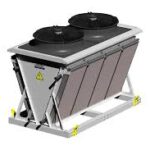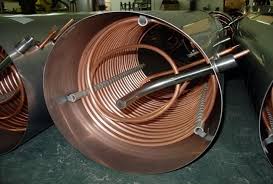Stainless Steel Heat Exchanger
Stainless Steel Heat Exchangers are devices that use stainless steel as the primary material for transferring heat between fluids. They are valued for their corrosion resistance, durability in high temperatures and pressures, and suitability for industries requiring sanitary conditions, such as food processing, pharmaceuticals, and chemicals.

Stainless Steel Heat Exchangers
Advantages of
- Corrosion Resistance: Stainless steel’s inherent resistance to corrosion and oxidation ensures durability and longevity in aggressive environments.
- High Temperature Resistance: Capable of withstanding high operating temperatures without compromising structural integrity or performance.
- Hygienic Properties: Smooth surface finish and non-reactive nature make stainless steel ideal for applications requiring strict hygiene standards, such as food and pharmaceutical industries.
- Strength and Durability: Offers robustness and mechanical strength, reducing the risk of damage and maintenance costs over the long term.
- Ease of Maintenance: Simple to clean and maintain due to smooth surfaces, reducing downtime and ensuring continuous operational efficiency.
Stainless Steel Heat Exchanger
Application on
- Industrial Processes
- HVAC Systems
- Food and Beverage Industry
- Pharmaceutical Manufacturing
- Power Generation
- Marine Applications
- Automotive Industry
- Aerospace and Defense
Stainless Steel Heat Exchangers
Functions of
Aerospace and Defense:
- In aerospace and defense applications, stainless steel heat exchangers are used in aircraft engines, spacecraft cooling systems, and military vehicles. They play a critical role in maintaining thermal management and operational efficiency under extreme conditions, ensuring performance and safety.
Marine Applications:
- In marine environments, where corrosion resistance is crucial, stainless steel heat exchangers are used aboard ships and offshore platforms. They withstand exposure to saltwater and harsh weather conditions while efficiently transferring heat for various marine applications, including engine cooling and HVAC systems.
Pharmaceutical Manufacturing:
- In pharmaceutical manufacturing, stainless steel heat exchangers are critical for maintaining sterile conditions and precise temperature control. They facilitate the heating, cooling, and drying of pharmaceutical products and ingredients, ensuring product quality and compliance with stringent regulatory standards.
Other Heat Exchangers We Manufacturer
Dry Cooler
Dry Cooler is a type of heat exchanger that uses ambient air to cool a fluid, typically water or a water-glycol mixture, without evaporating the fluid. It operates on the principle of sensible heat transfer

Copper Heat Exchangers
Copper Heat Exchangers are devices designed to efficiently transfer heat between two fluids or between a fluid and a solid surface. They utilize copper, a highly conductive metal known for its excellent thermal properties.

Marine Heat Exchanger
Marine Heat Exchangers are essential for cooling engines, generators, and onboard equipment using seawater or freshwater. Made from corrosion-resistant materials like titanium or cupronickel

Boiler Coils
Boiler coils are heat exchangers made of metal tubes arranged in a coil pattern, used in boiler systems to transfer heat from combustion gases to water or steam. They are typically made from heat-resistant materials

Tube in Tube Heat Exchanger
Tube in Tube Heat Exchangers consists of two concentric tubes where one fluid flows through the inner tube and another fluid flows through the annular space between the inner and outer tubes.

